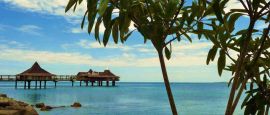New Caledonia History, Language and Culture
History of New Caledonia
Discovered and named by explorer Captain James Cook (it’s said the terrain reminded him of Scotland) in 1776, the island of New Caledonia became a French colony in 1853 and a French Overseas Territory in 1946. The indigenous population has attempted to free themselves from French rule on several occasions, including the Kanak Revolt of 1878.
In recent years, intermittent conflicts between the Melanesians and the French have occurred, and majority of Kanaks (Melanesians) now support the Front de Liberation Nationale Kanak et Socialiste (National Kanak Socialist Liberation Front, FLNKS) created in 1984 and led, until his assassination in 1989, by the charismatic Jean-Marie Tjibaou. The Front is the largest party backing independence, which remains the overriding political issue in the territory. In 2014 a referendum is scheduled which may finally see New Caledonia devolve from French rule.
New Caledonia is an incredibly important hotspot for biological diversity in because of its unique and complex ecological systems. Unlike its neighbours it is not volcanic, but a fragment of an ancient continent that drifted away some 250 million years ago. As such its flora and fauna have evolved in isolation, and are now quite unique. A wide variety of endemic species have flourished here.




 You know where
You know where